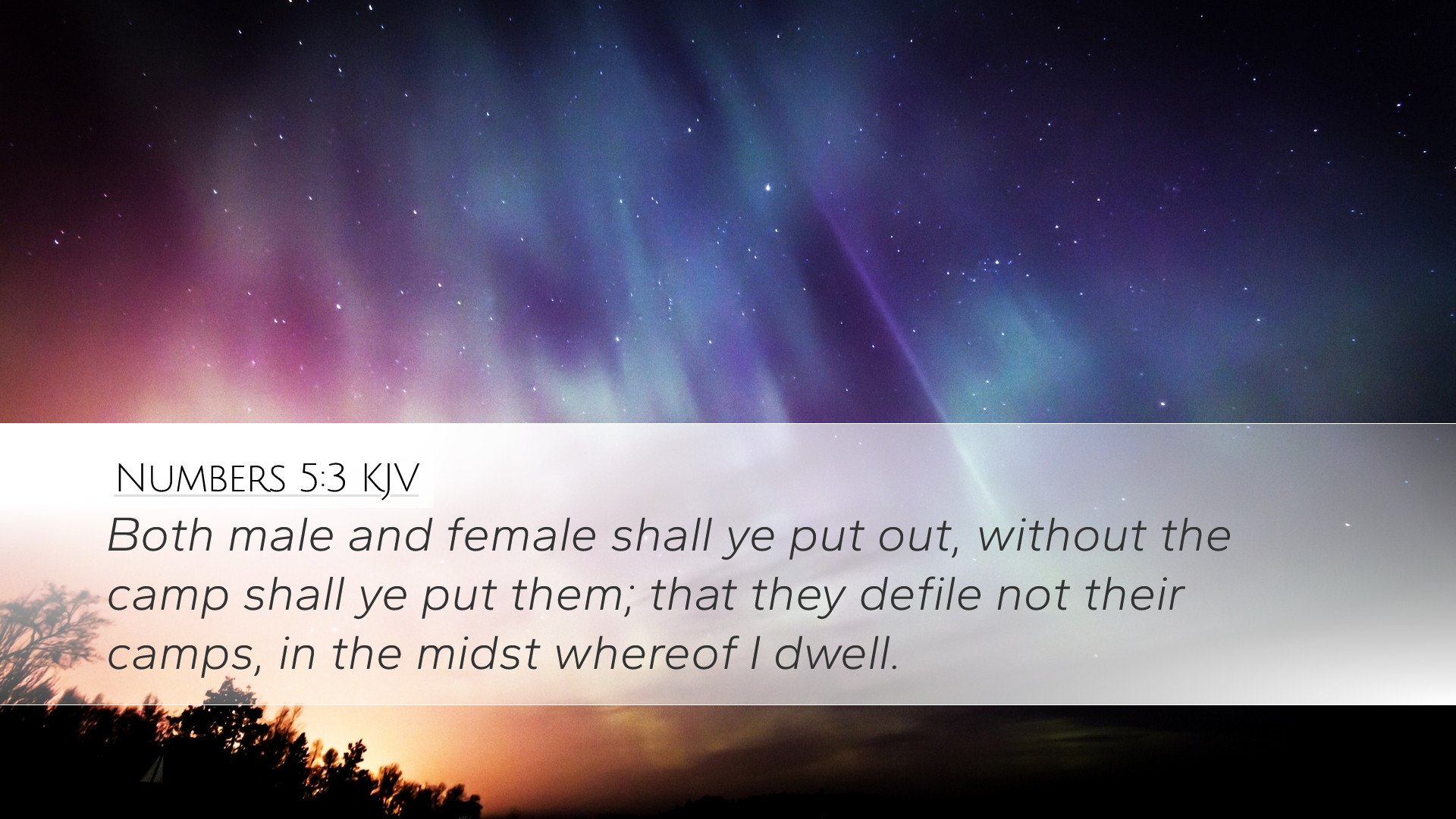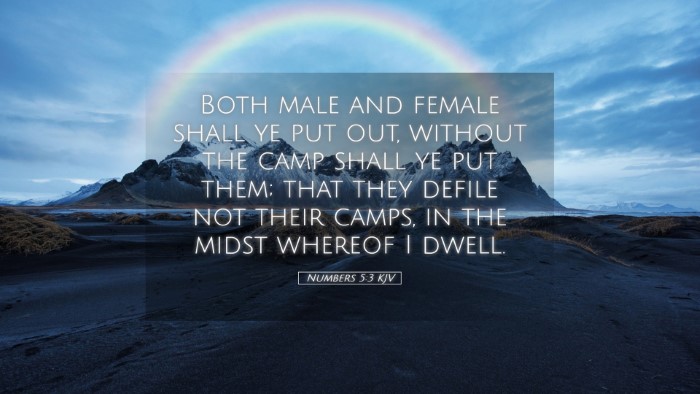Commentary on Numbers 5:3
Introduction
The verse Numbers 5:3 states: "Both male and female shall you put out of the camp; that they defile not their camps, in the midst whereof I dwell." This verse appears within the context of cleansing the camp of Israel from ceremonial uncleanness and disqualification due to sin. This commentary draws insights from public domain authors like Matthew Henry, Albert Barnes, and Adam Clarke, providing a multi-faceted exploration of this passage.
Contextual Overview
The Book of Numbers predominantly deals with the Israelites' journey through the wilderness and the establishment of their social and ceremonial laws. Chapter 5 specifically addresses purity within the camp, emphasizing God's holiness and the need for the people to maintain a state of cleanliness. This is vital, as the presence of the Lord was believed to dwell in their midst.
The Importance of Purity
Matthew Henry's Insights
Henry comments on the severity of defilement, arguing that spiritual purity and holiness were paramount for the Israelites. He notes that any degree of uncleanness could disrupt the intimate relationship they had with God. He emphasizes that God's presence demands a high standard of holiness. This reflects the wider biblical principles that integrity and purity are essential in approaching God.
Albert Barnes' Remarks
Barnes elaborates that the directives given to the Israelites stem from God's desire for a holy community. The necessity of exclusion for both genders underscores the universal need for individuals to recognize their sinfulness and their potential to contaminate the communal atmosphere. Everyone in the camp was subject to the same laws, which were designed to maintain order and purity.
Adam Clarke's Commentary
Clarke indicates that the term "put out of the camp" possesses both literal and metaphorical significance. While it denotes the physical removal of the unclean, it also symbolizes the spiritual reality of separation from sin and uncleanness. Clarke stresses that this act foreshadows the ultimate cleansing brought about in Christ, who removes sin not just from individuals but also from the community of faith.
Application of the Text
Lessons on Community and Holiness
This passage calls the leaders of the community to take an active role in maintaining spiritual and communal health. It reminds pastors, students, and theologians that the church, as the body of Christ, must oppose elements which could defile the congregation's holiness.
- The Role of Church Discipline: The concept of removing individuals who spread contagion, either morally or spiritually, is echoed in New Testament teachings (e.g., 1 Corinthians 5). Church leaders must exercise discernment and authority in maintaining congregational integrity.
- Symbolic Representation: The camp's purity is a type of the New Testament church, which is called to be a holy priesthood. The application of this verse encourages believers to reflect on their lives, ensuring they contribute positively to their spiritual community.
- Restoration and Grace: While the act of exclusion is necessary, it is also critical to remember the themes of forgiveness and restoration within the broader context of Scripture. Restoration should remain the ultimate goal in disciplinary actions, reflecting the character of God who seeks to bring the sinner back into fellowship.
The Nature of God's Presence
Theological Reflections
God's injunction to maintain purity in the camp expresses His desire to dwell among His people without reservation. The holiness of God is not just a concept to be observed but a reality that affects worship, community life, and personal conduct. Here, the theological emphasis laid out by Barnes indicates that God's very character necessitates a response of holiness from His people. Those who would approach Him must understand that they cannot do so lightly, particularly given the Holy God’s demand for holiness.
Concluding Thoughts
Numbers 5:3 serves as both a practical guide and a thematic foundation for understanding community life under God's governance. The insights drawn from Matthew Henry, Albert Barnes, and Adam Clarke affirm the ongoing relevance of these ancient truths for contemporary believers. In a world increasingly less aware of the implications of spiritual purity and communal integrity, this verse remains vital for all who seek to understand the holistic nature of living in God's presence.


